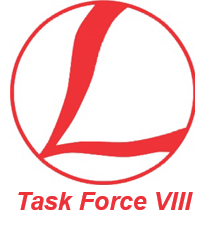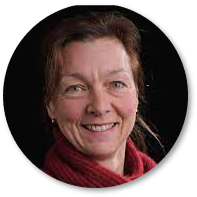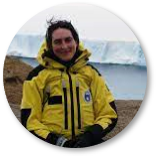
The heat flow summer 2023




REGISTRATION (booked out)
The IHFC Heat Flow Summerschool 2023 is over!
We enjoyed staying together in one accomodation, discuss topics in lectures and in the evening in an informal and open-spirit way.
Thanks to all sponsors, lecturers and all participants, this was a wonderful experience!
The accompanying workshops were deepening the process of in-depth understanding and of community building as well. Here, a great "Thank you!" for all presenters and for all the discussions!
We are looking forward for a new Heat Flow Summerschool. Details will be announced later this year.
The IUGG General Assembly 2023 took place in Berlin (Germany) from 11–20th of July. We planned a number of activities during or attached to the IUGG that are related to heat flow education and science. Amongst these activities were:
- July 03–07: 5-day summer school on heat flow determination and interpretation (Mon-Fri, at GFZ Potsdam) (done)
- July 08–09: 2 day workshop on heat flow in Antarctica (Sat-Sun, at GFZ Potsdam)(done)
- July 10–11: 2 day workshop on heat flow in Africa, South- and Central America (Mon-Tue, at GFZ Potsdam)(done)
- July 11–20: IUGG General Assembly 2023 (in Berlin) (done)
- July 17: IHFC 60th anniversary Heat flow symposium (at IUGG in Berlin) (done)
- July 17: 6-9 pm IHFC business meeting (at IUGG in Berlin) (done)

Content and Objectives: The heat flow summer school is aiming to provide comprehensive training on heat-flow determination and evaluation with particular reference to early-career scientists, young researchers, and encouraged students with pretensions to focus on this topic in their future career. The basic idea is to give opportunities to be trained on techniques of heat-flow determination and to extend the network of researchers interested in heat flow and related research topics. The participants will be involved in discussions and working groups and they will learn tools to resolve challenges in their daily work on heat-flow research. The summer school will comprise lectures, short talks, different discussion formats, and interactive group activities. We also intend to stimulate the participants to engage with institutions and the public in their home countries to improve science awareness on heat flow, help to develop informed opinions, and enhance the transferable skills of scientists.

What to expect
- five-day summer school on training master students and/or early career scientists in heat flow-determination and evaluation (preliminary program here-> program)
- lectures, short talks, different discussion formats, and interactive group activities held by international recognized heat-flow specialists (find a list of agreed experts here ->Foto + CV)
- providing tools to develop strategies to resolve challenges in daily work on heat-flow research
- field work for temperature profile at a local borehole and laboratory thermal properties estimation
Lecturer:
- Graeme Beardsmore (University of Melbourne)
- Juan Contreras (Ensenada Center for Scientific Research and Higher Education)
- Raquel Negrete-Aranda (Ensenada Center for Scientific Research and Higher Education)
- Massimo Verdoya (University of Genova)
- Florian Neumann (GFZ Potsdam)
- Ben Norden (GFZ Potsdam)
Program

Overview of detailed topics.
Application/Registration: The summer school is free of charge but registration is mandatory. Catering during the week, accommodation in Potsdam/Berlin, and local travel expenses are provided. [Apply now] The deadline for applications to the summer school is March 15, 2023.
Who can apply?
- Master students and/or early career scientists with the ambition to learn and work about heat-flow research.
How to apply?
- The application consists of:
- Let us know who you are:
- provide a motivation letter (max 200 words)
- your cv (not more than one page),
- Your application must be written in English.
- The limit of participants is 14
Travel grants and how to apply for
Partial travel grants upon request are also provided.
- Mention the need for a travel grant in the comment box of the registration form and list your travel budget. Master and PhD students should provide a reference letter from their supervisor.
- The submission deadline for our travel support is the 21th of February (extended).
Summary
- Venue: GFZ-Potsdam Building: A69
- Application deadline: 2023/04/01 23:59 local time, Potsdam CET
- Organizer: International Heat Flow Commission (IHFC)
- Co-organizer: GFZ-Potsdam, TF VIII of the International Lithosphere Program (ILP)
- Attendees: early-career scientists, young researchers, and students from Africa and Central-South America.
- Language: English
- School fee: Free of charge
- Supported by: IHFC, IUGG, IAPSO, IASPEI, IAVCEI, ILP, WHFD project, HeatflowX, INSTANT…. GFZ Heat flow group
Contact
- If you have further questions regarding the summer school or the application procedure, please contact us: heatflow@ihfc-iugg.org
How we decide ???
Candidates to the heatflow.summerschool are selected by two criteria:
- their motivation expressed
- the overall distribution of the countries of origin
- diversity and gender equality
Once the application is received, it is carefully examined by our staff. They check whether it fulfills the formal requirements and evaluate it according to the criteria listed above. The deadline for applications is March 15. We will inform the applicants latest April 01.
FAQ
Which nationalities are supported?
We support researchers from across the world. Currently, there are limitations to colleagues with affiliations from Russia and Belorussia. Please contact us if you are unsure whether you are eligible to apply.
Antarctica Workshop

Content and Objectives: The Antarctic workshop, following the summer school event, covers geothermal heat flow (GHF) affecting the ice sheet temperature, determining how it slides and internally deforms, as well as the rheological behavior of the lithosphere. GHF remains poorly constrained and there are large discrepancies in currently available glaciological and geophysical estimates. The workshop details on current methods and discusses their challenges and limitations and recommends key future directions in GHF research.
What to expect
- two-day Antarctica heat flow workshop
- establish ties with other heat-flow researchers and strengthen the network of young researchers working on this fascinating topic
Registration: Update: The workshop is booked out.
Contact Information: Florian Neumann (fneu@gfz-potsdam.de) Location: GFZ German Research Centre for Geosciences, Telegrafenberg, Potsdam. Building: A69 (Geoenergy) Room: Z01 Days: From July 08th – July 09th Organizer: Tobias Stål (University of Tasmania)
Workshop lead

Tobias Stål received a PhD in Geophysics in 2021 and is presently a postdoc research fellow at the Australian Centre for Excellence in Antarctic Studies (ACEAS) at the University of Tasmania. He is research is related on problems to ice/sold Earth interactions in Antarctica, including subglacial geothermal heat and explores computational and statistical methods to study Antarctica’s deep and shallow structure and properties. Furthermore he works on an Antarctic rock sample database (PetroChron), assuring quality control and updating the database structure and workflow. Tobias is co-chairing the SCAR INSTANT subcommittee for Antarctic geothermal heat and is leading the ACEAS workgroup for remote instrumentation. He has experience in coordinating and conducting remote fieldwork in the high Arctic and Antarctica, including seismic and GNSS deployment and geological mapping.
Selected publications:
- Stål, T., Reading, A. M., Fuchs, S., Halpin, J. A., Lösing, M., & Turner, R. J. (2022). Properties and biases of the global heat flow compilation. Frontiers in Earth Science, 10(August), 1–12. https://doi.org/10.3389/feart.2022.963525.
- Reading, A. M., Stål, T., Halpin, J. A., Lösing, M., Ebbing, J., Shen, W., McCormack, F. S., Siddoway, C. S., & Hasterok, D. (2022). Antarctic geothermal heat flow and its implications for tectonics and ice sheets. Nature Reviews Earth and Environment. https://doi.org/10.1038/s43017-022-00348-y.
- Stål, T., Reading, A. M., Halpin, J. A., and Whittaker, J. M. (2021). Antarctic Geothermal Heat Flow Model: Aq1. Geochemistry, Geophysics, Geosystems. https://doi.org/10.1029/2020GC009428.

Professor Anya Reading Ph.D, leads the 'Compute Antarctic' research group in the School of Natural Sciences (Physics), University of Tasmania. Her innovative approaches to computational geophysics build on a foundation of field seismology in challenging regions such as Antarctica and outback Australia. From 2010, members of her research group have pioneered the use of machine learning and multivariate statistical techniques for spatial data. These approaches, in tandem with geophysical modelling techniques, have attracted interest as industry-relevant solutions, and most recently, have been applied to progressing geophysical and interdisciplinary research initiatives with a focus on Earth-ice interactions in Antarctica.
- Reading, A.M., Stål, T, Halpin, J.A., Lösing, M., Ebbing, J., Shen, W., McCormack, F.S., Siddoway, C.S., Hasterok, D., 2022. Antarctic geothermal heat flow and its implications for tectonics and ice sheet, Nature Reviews Earth and Environment, DOI:10.1038/s43017-022-00348-y.
- Stål, T., Reading, A.M., Halpin, J.A. & Whittaker, J.M., 2021. Antarctic Geothermal Heat Flow Model: Aq1, Geochemistry, Geophysics, Geosystems, e2020GC009428.
- Stål, T., Reading, A.M., Halpin, J.A. & Whittaker, J.M., 2019. A Multivariate Approach for Mapping Lithospheric Domain Boundaries in East Antarctica, Geophysical Research Letters, 46, 10404-10416.

Felicity McCormack is an ice sheet modeller and Senior Lecturer at Monash University in Melbourne, Australia. She completed her PhD in 2015 at the University of Tasmania. Her research involves understanding controls on ice flow in Antarctica, including the interactions between basal sliding and deformation, and how different heat sources (geothermal heat flow, viscous and frictional heating) impact the basal ice temperature. Her research also involves fieldwork as part of the ICECAP project. Felicity is a Steering Committee member on the SCAR RINGS Action Group and an Investigator on the Australian Research Council Special Research Initiative Securing Antarctica's Environmental Future. Selected publications:
- McCormack, F.S., Roberts, J.L., Dow, C.F., Stål, T., Halpin, J.A., Reading, A.M. and Siegert, M.J., 2022. Fine‐Scale Geothermal Heat Flow in Antarctica Can Increase Simulated Subglacial Melt Estimates. Geophysical Research Letters, 49(15), p.e2022GL098539.
- Reading, A. M., Stål, T., Halpin, J. A., Lösing, M., Ebbing, J., Shen, W., McCormack, F. S., Siddoway, C. S., & Hasterok, D. (2022). Antarctic geothermal heat flow and its implications for tectonics and ice sheets. Nature Reviews Earth and Environment. https://doi.org/10.1038/s43017-022-00348-y.
- McCormack, F.S., Warner, R.C., Seroussi, H., Dow, C.F., Roberts, J.L. and Treverrow, A., 2022. Modeling the deformation regime of Thwaites Glacier, West Antarctica, using a simple flow relation for ice anisotropy (ESTAR). Journal of Geophysical Research: Earth Surface, 127(3), p.e2021JF006332.
Heat Flow Workshop on Africa, South Atlantic and South- and Central America:
Content and Objectives:
The heat-flow workshop will play a fundamental role in completing the summer school training program. The activities will be focused on the Global Heat Flow Data Assessment Project, which the IHFC started in 2021 and strategies for collaboration and developing projects to fill data gaps, in particular in Africa, and South- and Central America. The reasons for such target regions are: 1) the coverage and the overall quality of heat flow data is poor and 2) there are only a few heat-flow researchers active in these regions.
What to expect
- two-day ACSA workshop on strategies and promotion in heat flow activities and discussion on the current heat flow assessment project.
- By participating the ACSA workshop you will jointly elaborate a white paper on the heat-flow developments for target regions
Registration: Update: The workshop is booked out.
Contact Information: Florian Neumann (fneu@gfz-potsdam.de) Location: GFZ German Research Centre for Geosciences, Telegrafenberg, Potsdam. Building: A69 (Geoenergy) Room: Z01 Days: From July 10th – July 11th
Organizer:
- Sven Fuchs (GFZ Potsdam)
- Ben Norden (GFZ Potsdam)
- Florian Neumann (GFZ Potsdam)
Sponsoring
The above mentioned activities are sponsored by:




